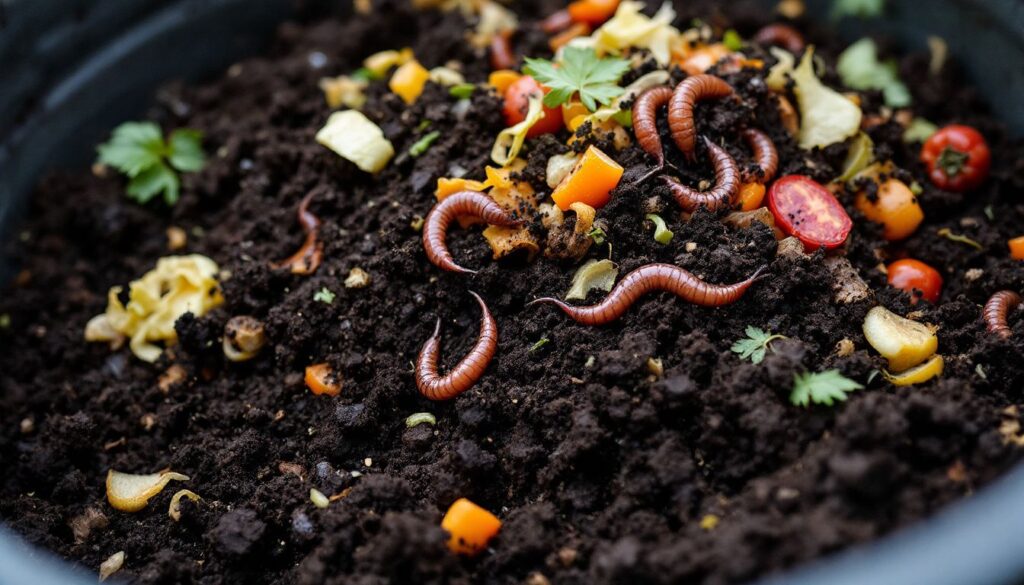Looking for a green business that turns rubbish into riches? Many of us struggle to find truly sustainable business models that earn proper money while helping our planet. Commercial vermicomposting uses worms to turn over 25 million tonnes of food scraps and paper waste into valuable soil products each year in the US alone.
We’ll guide you through setting up, running, and profiting from a worm farming operation that gives back to the earth. Are you interested in starting a commercial vermicompost business?
What is Commercial Vermicomposting?

Commercial vermicomposting turns organic waste into valuable worm castings at a large scale. We use special systems like Continuous Flow Through (CFT) bins where worms eat organic matter added to the top.
The finished worm castings drop to the bottom for easy harvest. This industrial process comes in two main types: container systems with bottom harvesting and tray systems with perforated bottoms.
Professional vermicomposting creates a profitable business from waste that would otherwise go to landfills.
Commercial vermicomposting isn’t just good for the planet—it’s good for your wallet too.
Our next section will explore the many benefits that make commercial vermicomposting both an eco-friendly and smart business choice.
Benefits of Commercial Vermicomposting
Commercial vermicomposting offers major benefits for businesses and our planet. We’ll explore how this green approach creates profit while solving waste problems.
Environmental sustainability
We care deeply about our planet’s future. Commercial vermicomposting offers a green solution to waste problems facing our communities today. The EPA reports that 25 million tons of food scraps, unrecyclable paper, and cardboard go to waste each year.
This massive amount could feed worms instead of filling landfills. Our schools, hospitals, and businesses create 35-45% of all U.S. waste according to 2006 EPA data. These facts show why waste reduction through vermicomposting matters so much.
Organic waste recycling turns trash into treasure while cutting harmful methane gases from landfills. The environmental impact of this simple process extends far beyond just waste management.
Next, let’s explore how this earth-friendly practice creates profitable business chances too.
Profitable business opportunities
Commercial vermicomposting offers solid profit potential for entrepreneurs in the green sector. Our Michigan SoilWorks CFT system produces about 350 pounds of vermicompost weekly, which creates a steady income stream.
Many businesses like Urban Worm Company sell these valuable worm castings directly to customers through their website and Amazon marketplace.
The initial investment in quality equipment pays for itself through consistent production and premium pricing.
Starting a commercial operation requires capital, with the smallest commercial-grade CFT systems priced from £5,000. This investment opens doors to multiple revenue streams including bulk sales to farms, packaged products for home gardeners, and custom blends for specialty growers.
The organic fertilizer market continues to grow as more people seek natural alternatives to chemical products.
Upcycling organic waste
We transform waste into wealth through vermicomposting. Our earthworms (Eisenia fetida) eat up to 35% of their body weight each day, turning garbage into gold. This makes them perfect partners for handling the massive amounts of food and paper waste from businesses.
Did you know that 74% of restaurant waste is food and paper? EPA studies from 1999 confirm this fact. These materials don’t need to fill landfills – they can feed our worms instead.
Food scraps, coffee grounds, and paper products become valuable compost through this natural process. The worms break down these materials faster than traditional composting methods.
Our systems create rich, dark soil that plants love. This organic waste recycling helps cut down on methane gas from landfills while making a product farmers will pay for. Let’s explore the key requirements needed to set up a successful large-scale vermicomposting operation.
Key Requirements for Large-Scale Vermicomposting
Setting up a large-scale vermicomposting business needs proper planning for space, climate control, and input-output rates. Read on to learn more!
Space and climate considerations
Space plays a crucial role in commercial vermicomposting success. We need ample room for our worm beds, processing equipment, and storage areas. Large-scale operations require careful planning of facility layout to maximize efficiency.
Most commercial ventures use at least 5,000 square feet for a viable business model.
Climate control stands as a top priority for year-round production. Industrial CFTs (Continuous Flow Technology systems) offer rigid, single-compartment structures that maintain optimal conditions.
These systems work best in colder climates, as proven by Worm Power in New York. Their success shows how proper climate management boosts production rates even in harsh weather. Temperature stability between 15-25°C keeps worms active and productive throughout the year.
The right space and climate control systems don’t just keep worms alive—they create the perfect environment for maximum casting production and business profitability.
Next, we’ll explore the input and output rates that drive commercial vermicomposting operations.
Input and output rates
We measure success in commercial vermicomposting by how much finished product we get from our space. Real numbers show huge differences in efficiency. A California vermicomposter produces about 800 cubic yards from 36,000 square feet, which equals 0.02 cubic yards per square foot yearly.
Michigan SoilWorks CFT systems offer much better results. These systems can yield 0.33 cubic yards per square foot – that’s 16 times more efficient! Your input rates (how much waste you feed the worms) must match your worm population size.
Too much waste causes bad smells and pest problems. Too little means wasted capacity and lower profits.
Essential Equipment for Commercial Vermicomposting
The right tools make all the difference in commercial vermicomposting. Keep reading to learn about the best equipment that will boost your worm farming success.
Continuous Flow Technology (CFT) systems
We recommend Continuous Flow Technology systems as the backbone of any commercial vermicomposting operation. These modular vermicomposting systems allow worms to live in the top layers while finished castings drop to the bottom for easy harvest.
Our team values the Michigan SoilWorks CFT for its smart modular design, though business owners should budget over $5,000 for the base model. CFT systems feature special cutting bars that release 1-2 inches of vermicompost at a time, making harvest simple and less stressful for the worms.
Commercial vermicomposting machinery like CFT systems helps scale operations without adding much labor. Worms naturally move upward toward fresh food, leaving their castings below.
This industrial vermicomposting equipment creates a hands-off process that saves time and protects worm populations during harvest. Many farms find continuous flow composting technology pays for itself through increased output and reduced labor costs.
Turbo Sift™ compost screeners
We use Turbo Sift™ compost screeners as key tools in our commercial vermicomposting systems. These machines play a vital role in continuous flow through (CFT) systems by making worm casting harvest much faster.
Our screeners sort the finished compost from other organic matter with less effort. The best part? They help worms move upward during the process, which keeps their home less disturbed.
Many of our clients love how these screeners boost their daily output rates. We offer full help with setting up these systems and teach you how to run them well.
Quality vermicomposting starts with the right tools. Turbo Sift™ screeners cut harvest time in half while keeping worm populations healthy and thriving.
Next, let’s look at the rules and laws you need to know about when running a vermicomposting business.
Feeding and harvesting tools
Beyond the screening process, proper feeding and harvesting tools make daily operations smooth in commercial vermicomposting. Our teams rely on cutting bars that come in three power options: electric, hydraulic, or manual.
These cutting tools help break down larger waste materials into worm-friendly sizes. For moving heavy materials across the facility, rolling platforms with omni-directional casters prove invaluable.
These platforms allow staff to transport organic matter and finished castings without strain.
The right tools save time and reduce physical stress on workers in large-scale operations. Electric cutting tools work best for high-volume facilities, while manual options suit smaller setups.
Movement equipment like rolling carts helps maintain efficient workflow between different processing areas. Good quality harvesting implements last longer and need less replacement, which cuts down long-term costs for vermicomposting businesses.
Regulations and Compliance
We must follow strict rules when running a vermicomposting business. Local councils and national bodies set standards that protect our environment and public health.
Waste management standards
Waste management standards play a vital role in commercial vermicomposting. Our industry follows specific guidelines that ensure organic waste gets properly upcycled. These standards help us use continuous flow systems that turn food scraps, yard debris, and sewage sludge into valuable compost.
Many local councils now require proper handling of organic materials.
Quality control measures remain essential for producing top-grade vermicastings. We apply regulatory requirements that keep our composting operations sustainable and compliant with environmental laws.
The best part? These standards actually improve our end product while reducing harmful waste. Continuous flow technology creates stable composting conditions that meet strict municipal waste processing rules.
Local and national environmental laws
Beyond waste management standards, we must follow specific environmental laws at both local and national levels. Continuous flow vermicomposting helps us comply with organic waste regulations that many areas now enforce.
Our pre-composting methods match the standards needed for safe worm activity and clean end products. Many cities now support vermicomposting as part of their waste plans, but we need to know each area’s rules.
Health and safety laws require us to test our products to ensure they contain no harmful pathogens. Our innovative approaches to vermicomposting meet strict operational standards while turning waste into valuable resources.
These environmental laws exist to protect our soil, water, and air quality as we grow our vermicomposting business.
Market Opportunities for Vermicompost
The market for vermicompost offers vast money-making chances for smart business owners. Worm castings fetch premium prices as more farmers and gardeners seek organic solutions for soil health.
Selling high-quality worm castings
We sell premium worm castings through our website and Amazon store, just like Urban Worm Company does. Our products stand out in the organic fertilizer market because they offer pure soil enrichment without chemicals.
Many gardeners seek our nutrient-rich compost to boost plant growth and health. Using a Michigan SoilWorks CFT system, we produce about 350 pounds of vermicompost weekly, ensuring a steady supply for our customers.
Our earthworm castings serve as a top-tier soil amendment that farms, nurseries, and home gardeners value greatly. This natural “worm poop” contains helpful microbes that improve soil structure and plant health.
We package our product in various sizes to meet different needs, from small garden plots to large agricultural projects. Next, let’s explore how partnering with farms and nurseries can expand your vermicomposting business reach.
Partnering with farms and nurseries
Farms make great partners for our commercial vermicomposting business. Many farmers prefer eco-friendly manure options, making our worm castings a perfect match for their needs. Our partnerships help farmers boost crop yields through high-quality vermicastings while we gain access to their organic waste.
This creates a win-win cycle of sustainability and profit.
Nurseries also benefit greatly from our vermicompost products. Their plants thrive with our nutrient-rich castings, and they often become steady customers. Joint ventures between our operation and local farms improve both sustainability and profits for everyone involved.
The next section explores how to supply landscaping businesses with our premium vermicompost products.
Supplying to landscaping businesses
Landscaping businesses make perfect partners for our vermicompost products. We supply high-quality worm castings that boost soil health and improve plant growth for their projects.
Our vermicompost helps landscapers achieve better crop yields while staying true to eco-friendly practices. Many landscape firms now seek sustainable options like our worm compost to enhance their soil conditioning services.
The growing amount of organic waste has opened up more chances for us to work with these companies.
Wormgear offers special systems that fit what landscapers need for waste management. These tools let them turn plant waste into rich soil on site. The green aspects of vermicomposting match well with modern landscaping goals of soil fertility and natural plant nutrition.
Local landscapers who use our products report stronger plants and less need for chemical inputs. This creates a win-win situation where waste gets diverted from landfills while creating valuable soil amendments.
Tips for Success in Commercial Vermicomposting
We know the secrets to making your commercial vermicomposting venture thrive. Our team has tested these methods across dozens of worm farms to boost profits and cut waste.
Maintaining optimal worm conditions
We keep our worms happy by watching moisture levels carefully. Our tests show moisture problems take weeks to show up, so we check beds daily rather than waiting for signs of trouble.
Proper temperature matters too! Our facilities use R49 insulation combined with geothermal heating systems to maintain steady temperatures year-round. This setup protects our worm population from extreme weather that could slow down bioconversion rates.
Moisture and temperature control directly impact microorganism activity and nutrient cycling in our vermiculture systems. The right equipment helps us track these vital factors for successful organic waste management and soil conditioning.
Investing in durable technology makes these monitoring tasks much easier and more accurate.
Investing in durable technology
We invest in top-quality equipment for our commercial vermicomposting operations. The Michigan SoilWorks CFT system stands out with its precision-engineered components that last for years.
Each unit features powder-coated steel construction and a galvanised mesh bottom that resists rust and decay. These high-quality components mean less money spent on repairs and more profit from your worm casting business.
Durable technology pays off in the long run for industrial composting systems. Our equipment handles tons of organic waste without breaking down, which keeps production flowing smoothly.
The powder-coated finish protects against moisture and harsh weather conditions that often damage lesser systems. Next, let’s explore how maintaining optimal worm conditions can boost your vermicomposting success.
Recording data for efficiency
We track all our vermicomposting activities to boost our success rates. Our data logs include daily temperature readings, feeding amounts, moisture levels, and worm population changes.
This practice helps us spot problems early and make quick fixes before issues harm our worms. Data shows that farms need at least 4 months before their first sellable harvest, with 6 months giving the best results.
Our records show that adding dry coco coir greatly improves wet castings quality. The numbers demonstrate that farms that keep good records produce more consistent products and earn higher profits.
Good record-keeping also helps us meet waste management rules and prove our green practices to buyers. Next, we’ll examine some key tips for success in commercial vermicomposting.
Conclusion
Commercial vermicomposting offers a smart path to turn waste into wealth. Worm farming creates jobs while helping our planet heal from waste problems. Your business can grow steadily as more farms and gardens seek natural fertilizers.
Getting started might cost money upfront, but the long-term gains make it worthwhile. Join the movement of earth-friendly business owners who prove that doing good for the soil means doing well for your wallet too.




